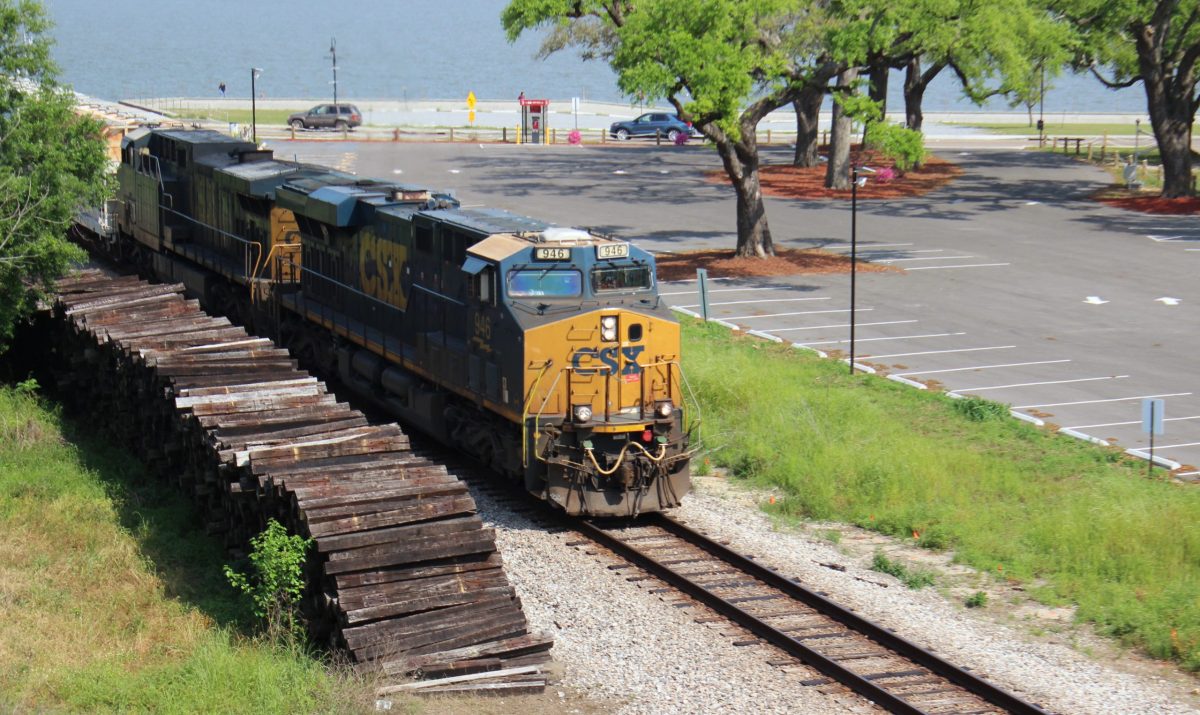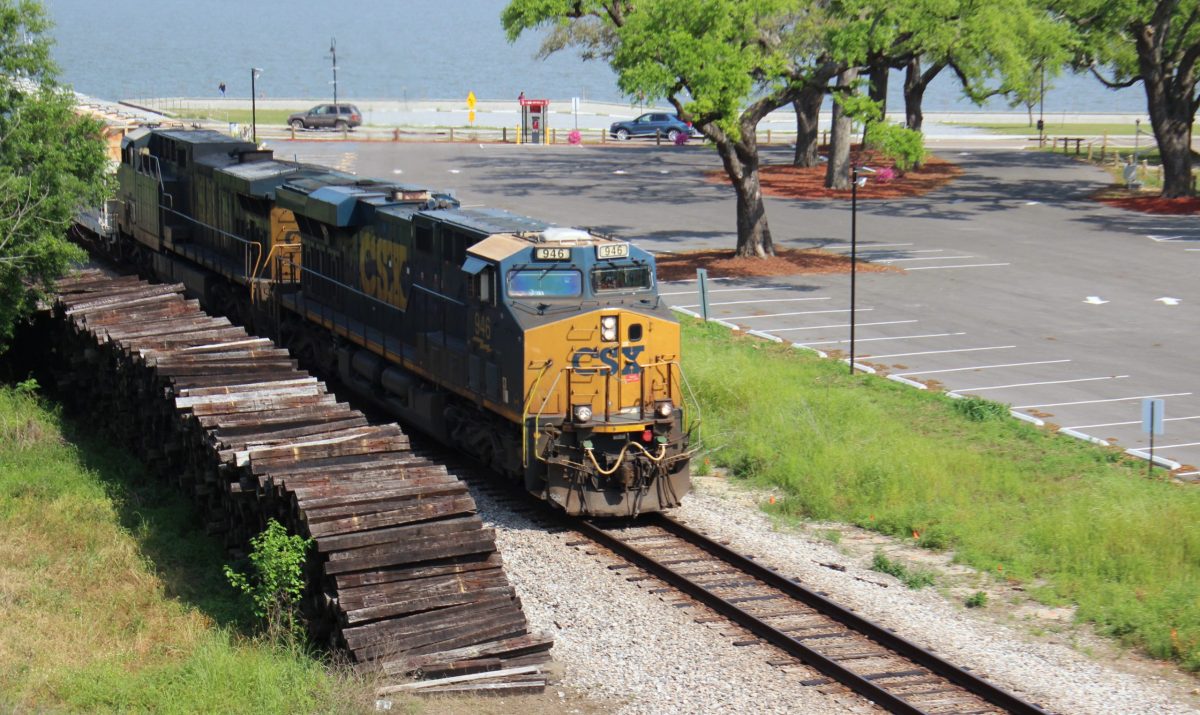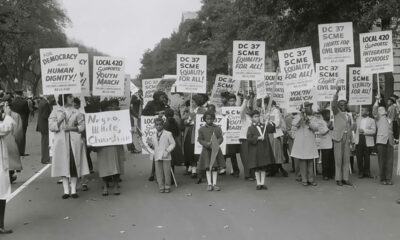Mississippi Today
Details emerge over Gulf Coast Amtrak route from Mobile to New Orleans, as former enemies become funding partners


Details emerge over Gulf Coast Amtrak route from Mobile to New Orleans, as former enemies become funding partners
As Amtrak plans for a 2023 start date, the freight companies and Alabama port that once said passenger rail’s return to the Mississippi Gulf Coast could be detrimental to business are now pledging millions of dollars in improvements to the tracks between Mobile and New Orleans.
The freight companies and Alabama Port Authority have promised to pay a collective $15 million to improve the passenger train’s route in efforts to decrease the total time it will take Amtrak to go between New Orleans and Mobile, according to details obtained by a Mississippi Today records request.
Amtrak had been at odds with the freight companies for years — so much so it filed a complaint to a federal board that has spent the last determining if the freight-owned tracks could handle added passenger traffic.
Arguments, at times, got ugly with Amtrak once posting a live video feed and snarky tweets about how often — or not — freight trains came through the corridor.
Amtrak, the port, and freight companies CSX Transportation and Norfolk Southern mediated an agreement over the once-contested route, rather than putting the dispute to a board vote. Since they announced that agreement last month, they have all been tight-lipped about its terms or specifics about the route’s future beyond saying it was moving ahead.
READ MORE: Amtrak passenger route will return to Mississippi Gulf Coast
Mississippi Today has been able to glean some details of what the parties have planned after examining a copy of a grant application by the Southern Rail Commission that requests nearly $179 million in federal money to help pay for a “Gulf Coast Corridor Improvement Project.” The application also details $44 million in non-federal matching funds from the project’s partners.
“What I can say is that once these improvements are made, it will result in a 3-hour-and-23-minute trip time,” Southern Rail Commission chairman Knox Ross told Mississippi Today. “At the beginning, you will have something longer than that.”
The Southern Rail Commission was already awarded $33 million in 2019 through the same grant program — Consolidated Rail Infrastructure and Safety Improvements Grant Program – for the Gulf Coast route. None of that money has been spent yet.
Under the Biden Administration, there is $1.4 billion available to improve railways’ speed and safety this year through the program. That’s more than four times the amount allocated in 2021, according to the American Short Line and Regional Railroad Association.
The improvement plans in this year’s application detail construction and track improvements lasting until 2026, but the route can still run while the bulk of the improvements are being made.
Knox declined to comment further on the application or agreement. Amtrak referred any comments back to the information submitted in the hefty application.
In a letter supporting the project included in the application, CSX specified it would pay nearly $9.9 million in matching funds.
“The Project will facilitate the introduction of a new twice-daily Amtrak service between New Orleans and Mobile, while simultaneously supporting freight service quality,” wrote the company’s Executive Vice President of Operations Jamie Boychuk.
In a similar letter, the Alabama State Port Authority promised to contribute $750,000 in funds to support the route. The Mississippi Legislature had already allocated just under $14 million in funding to support route improvements. The state of Louisiana has pledged roughly another $9 million. The Port of Pascagoula pledged $2 million.
Amtrak has an existing $6 million in contributions.
“Implementing a twice-daily service between New Orleans and Mobile would provide a huge economic lift to Bay St. Louis, Gulfport, Biloxi and Pascagoula, and other cities along Mississippi’s Gulf Coast,” wrote U.S. Sen. Roger Wicker in a letter also included with the application. “It would serve as a culmination of Mississippi’s efforts to recover from Hurricane Katrina. Since 2010, the population of the Mississippi Gulf Coast has grown steadily, and an additional transportation option would encourage further growth and improve quality of life for current residents.”
The application spells out 12 separate “components” within the overall project totaling about $223 million.
Among the listed improvements is a new station track in Mobile, which will not be funded by the grant but by CSX, according to the application. The improvements will allow for Amtrak trains to board and deboard passengers within the Mobile Terminal downtown.
The proposed grant-funded improvements include extending tracks, installing new switches and turnouts, additional crossovers and improving stations, yard and crossings. Specifically, it calls for “significant station improvements” along the Mississippi stops.
That includes a new station building in Biloxi and platform canopies in Bay St. Louis and Gulfport. In Pascagoula, Amtrak may attempt to acquire the historic train depot, which was built in 1904 and registered as a historic place in the 1970s, or build a new building nearby.
The plan also calls for improving railroad crossings at multiple points on the 85-miles of track that go through Mississisippi.
Should the grant be awarded, project management would be coordinated by Knox and the Southern Rail Commission.
In a note included in the application, the Southern Rail Commission explained it’s asking for more funds than it did in 2018 because the costs of construction and the available infrastructure dollars have increased, and because of the new public-private partnerships “bringing momentum.”
“This Project is the epitome of various parties joining together to commit resources to expand intercity passenger service while maintaining viable freight networks essential to the economic viability of the rural areas and ensuring the safety and efficiency of operations in the New Orleans to Mobile rail corridor,” the commission wrote.
Ultimately, the commission hopes to make Union Passenger Terminal in New Orleans a hub that connects Mobile — and its Mississippi stops in between — with routes to Baton Rouge and toward Texas.
This article first appeared on Mississippi Today and is republished here under a Creative Commons license.
Mississippi Today
Speaker White wants Christmas tree projects bill included in special legislative session

House Speaker Jason White sent a terse letter to Lt. Gov. Delbert Hosemann on Thursday, saying House leaders are frustrated with Senate leaders refusing to discuss a “Christmas tree” bill spending millions on special projects across the state.
The letter signals the two Republican leaders remain far apart on setting an overall $7 billion state budget. Bickering between the GOP leaders led to a stalemate and lawmakers ending their regular 2025 session without setting a budget. Gov. Tate Reeves plans to call them back into special session before the new budget year starts July 1 to avoid a shutdown, but wants them to have a budget mostly worked out before he does so.
White’s letter to Hosemann, which contains words in all capital letters that are underlined and italicized, said that the House wants to spend cash reserves on projects for state agencies, local communities, universities, colleges, and the Mississippi Department of Transportation.
“We believe the Senate position to NOT fund any local infrastructure projects is unreasonable,” White wrote.
The speaker in his letter noted that he and Hosemann had a meeting with the governor on Tuesday. Reeves, according to the letter, advised the two legislative leaders that if they couldn’t reach an agreement on how to disburse the surplus money, referred to as capital expense money, they should not spend any of it on infrastructure.
A spokesperson for Hosemann said the lieutenant governor has not yet reviewed the letter, and he was out of the office on Thursday working with a state agency.
“He is attending Good Friday services today, and will address any correspondence after the celebration of Easter,” the spokesperson said.
Hosemann has recently said the Legislature should set an austere budget in light of federal spending cuts coming from the Trump administration, and because state lawmakers this year passed a measure to eliminate the state income tax, the source of nearly a third of the state’s operating revenue.
Lawmakers spend capital expense money for multiple purposes, but the bulk of it — typically $200 million to $400 million a year — goes toward local projects, known as the Christmas Tree bill. Lawmakers jockey for a share of the spending for their home districts, in a process that has been called a political spoils system — areas with the most powerful lawmakers often get the largest share, not areas with the most needs. Legislative leaders often use the projects bill as either a carrot or stick to garner votes from rank and file legislators on other issues.
A Mississippi Today investigation last year revealed House Ways and Means Chairman Trey Lamar, a Republican from Sentobia, has steered tens of millions of dollars in Christmas tree spending to his district, including money to rebuild a road that runs by his north Mississippi home, renovate a nearby private country club golf course and to rebuild a tiny cul-de-sac that runs by a home he has in Jackson.
There is little oversight on how these funds are spent, and there is no requirement that lawmakers disburse the money in an equal manner or based on communities’ needs.
In the past, lawmakers borrowed money for Christmas tree bills. But state coffers have been full in recent years largely from federal pandemic aid spending, so the state has been spending its excess cash. White in his letter said the state has “ample funds” for a special projects bill.
“We, in the House, would like to sit down and have an agreement with our Senate counterparts on state agency Capital Expenditure spending AND local projects spending,” White wrote. “It is extremely important to our agencies and local governments. The ball is in your court, and the House awaits your response.”
This article first appeared on Mississippi Today and is republished here under a Creative Commons Attribution-NoDerivatives 4.0 International License.
Mississippi Today
Advocate: Election is the chance for Jackson to finally launch in the spirit of Blue Origin

Editor’s note: This essay is part of Mississippi Today Ideas, a platform for thoughtful Mississippians to share fact-based ideas about our state’s past, present and future. You can read more about the section here.
As the world recently watched the successful return of Blue Origin’s historic all-women crew from space, Jackson stands grounded. The city is still grappling with problems that no rocket can solve.
But the spirit of that mission — unity, courage and collective effort — can be applied right here in our capital city. Instead of launching away, it is time to launch together toward a more just, functioning and thriving Jackson.
The upcoming mayoral runoff election on April 22 provides such an opportunity, not just for a new administration, but for a new mindset. This isn’t about endorsements. It’s about engagement.
It’s a moment for the people of Jackson and Hinds County to take a long, honest look at ourselves and ask if we have shown up for our city and worked with elected officials, instead of remaining at odds with them.
It is time to vote again — this time with deeper understanding and shared responsibility. Jackson is in crisis — and crisis won’t wait.
According to the U.S. Census projections, Jackson is the fastest-shrinking city in the United States, losing nearly 4,000 residents in a single year. That kind of loss isn’t just about numbers. It’s about hope, resources, and people’s decision to give up rather than dig in.
Add to that the long-standing issues: a crippled water system, public safety concerns, economic decline and a sense of division that often pits neighbor against neighbor, party against party and race against race.
Mayor Chokwe Antar Lumumba has led through these storms, facing criticism for his handling of the water crisis, staffing issues and infrastructure delays. But did officials from the city, the county and the state truly collaborate with him or did they stand at a distance, waiting to assign blame?
On the flip side, his runoff opponent, state Sen. John Horhn, who has served for more than three decades, is now seeking to lead the very city he has represented from the Capitol. Voters should examine his legislative record and ask whether he used his influence to help stabilize the administration or only to position himself for this moment.
Blaming politicians is easy. Building cities is hard. And yet that is exactly what’s needed. Jackson’s future will not be secured by a mayor alone. It will take so many of Jackson’s residents — voters, business owners, faith leaders, students, retirees, parents and young people — to move this city forward. That’s the liftoff we need.
It is time to imagine Jackson as a capital city where clean, safe drinking water flows to every home — not just after lawsuits or emergencies, but through proactive maintenance and funding from city, state and federal partnerships. The involvement of the U.S. Environmental Protection Agency in the effort to improve the water system gives the city leverage.
Public safety must be a guarantee and includes prevention, not just response, with funding for community-based violence interruption programs, trauma services, youth job programs and reentry support. Other cities have done this and it’s working.
Education and workforce development are real priorities, preparing young people not just for diplomas but for meaningful careers. That means investing in public schools and in partnerships with HBCUs, trade programs and businesses rooted right here.
Additionally, city services — from trash collection to pothole repair — must be reliable, transparent and equitable, regardless of zip code or income. Seamless governance is possible when everyone is at the table.
Yes, democracy works because people show up. Not just to vote once, but to attend city council meetings, serve on boards, hold leaders accountable and help shape decisions about where resources go.
This election isn’t just about who gets the title of mayor. It’s about whether Jackson gets another chance at becoming the capital city Mississippi deserves — a place that leads by example and doesn’t lag behind.
The successful Blue Origin mission didn’t happen by chance. It took coordinated effort, diverse expertise and belief in what was possible. The same is true for this city.
We are not launching into space. But we can launch a new era marked by cooperation over conflict, and by sustained civic action over short-term outrage.
On April 22, go vote. Vote not just for a person, but for a path forward because Jackson deserves liftoff. It starts with us.
Pauline Rogers is a longtime advocate for criminal justice reform and the founder of the RECH Foundation, an organization dedicated to supporting formerly incarcerated individuals as they reintegrate into society. She is a Transformative Justice Fellow through The OpEd Project Public Voices Fellowship.
This article first appeared on Mississippi Today and is republished here under a Creative Commons Attribution-NoDerivatives 4.0 International License.![]()
Mississippi Today
On this day in 1959, students marched for integrated schools

April 18, 1959

About 26,000 students took part in the Youth March for Integrated Schools in Washington, D.C. They heard speeches by Martin Luther King Jr., A. Phillip Randolph and NAACP leader Roy Wilkins.
In advance of the march, false accusations were made that Communists had infiltrated the group. In response, the civil rights leaders put out a statement: “The sponsors of the March have not invited Communists or communist organizations. Nor have they invited members of the Ku Klux Klan or the White Citizens’ Council. We do not want the participation of these groups, nor of individuals or other organizations holding similar views.”
After the march, a delegation of students went to present their demands to President Eisenhower, only to be told by his deputy assistant that “the president is just as anxious as they are to see an America where discrimination does not exist, where equality of opportunity is available to all.”
King praised the students, saying, “In your great movement to organize a march for integrated schools, you have awakened on hundreds of campuses throughout the land a new spirit of social inquiry to the benefit of all Americans.”
This article first appeared on Mississippi Today and is republished here under a Creative Commons Attribution-NoDerivatives 4.0 International License.![]()
-

 News from the South - Arkansas News Feed7 days ago
News from the South - Arkansas News Feed7 days agoMeasles cases confirmed in Arkansas children after travel exposure
-

 News from the South - Alabama News Feed7 days ago
News from the South - Alabama News Feed7 days agoImpacts of Overdraft Fees | April 11, 2025 | News 19 at 10 p.m.
-

 Mississippi Today5 days ago
Mississippi Today5 days agoOn this day in 1873, La. courthouse scene of racial carnage
-

 News from the South - Georgia News Feed7 days ago
News from the South - Georgia News Feed7 days ago1-on-1 with Gov. Kemp’s Senior Advisor | Full interview
-

 News from the South - Missouri News Feed7 days ago
News from the South - Missouri News Feed7 days agoMom and son targeted in carjackings, stolen cars crime spree
-

 Local News6 days ago
Local News6 days agoAG Fitch and Children’s Advocacy Centers of Mississippi Announce Statewide Protocol for Child Abuse Response
-

 Local News5 days ago
Local News5 days agoSouthern Miss Professor Inducted into U.S. Hydrographer Hall of Fame
-

 News from the South - Arkansas News Feed7 days ago
News from the South - Arkansas News Feed7 days agoFederal investigators looking into cause of deadly NYC helicopter crash













































